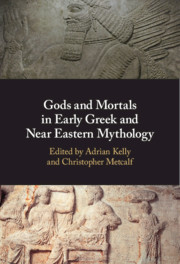Book contents
- Gods and Mortals in Early Greek and Near Eastern Mythology
- Gods and Mortals in Early Greek and Near Eastern Mythology
- Copyright page
- Contents
- Tables
- Contributors
- Acknowledgements
- Abbreviations
- Introduction
- Part I Contexts
- Part II Influence
- Part III Difference
- Chapter 11 Borrowing, Dialogue and Rejection
- Chapter 12 Divine Labour
- Chapter 13 Influence and Inheritance
- Chapter 14 Fate and Authority in Mesopotamian Literature and the Iliad
- Chapter 15 Fashioning Pandora
- Chapter 16 Sexing and Gendering the Succession Myth in Hesiod and the Ancient Near East
- Bibliography
- Index
Chapter 14 - Fate and Authority in Mesopotamian Literature and the Iliad
from Part III - Difference
Published online by Cambridge University Press: 27 March 2021
- Gods and Mortals in Early Greek and Near Eastern Mythology
- Gods and Mortals in Early Greek and Near Eastern Mythology
- Copyright page
- Contents
- Tables
- Contributors
- Acknowledgements
- Abbreviations
- Introduction
- Part I Contexts
- Part II Influence
- Part III Difference
- Chapter 11 Borrowing, Dialogue and Rejection
- Chapter 12 Divine Labour
- Chapter 13 Influence and Inheritance
- Chapter 14 Fate and Authority in Mesopotamian Literature and the Iliad
- Chapter 15 Fashioning Pandora
- Chapter 16 Sexing and Gendering the Succession Myth in Hesiod and the Ancient Near East
- Bibliography
- Index
Summary
This chapter considers another important topic in the rich body of early Greek and ancient Near Eastern divine narratives: the issue of fate and divine authority. In the author’s analysis, Sumerian and Akkadian sources tend to describe fate as being under the control of the gods, who employ it as a tool in governing the universe; fate can be said to take physical shape, such as an inscribed tablet. In early Greek literature, on the other hand, fate is not a matter of divine decrees, but mainly regarded as something assigned to individuals, and the Greek epic tradition is less explicit on its nature and physical shape. Comparison of the theme of divine authority, which is a concern to both Mesopotamian and early Greek epic poetry, illustrates the wisdom of the use by the leading god or gods of consultation and tactical response to the demands of other deities: if autocracy leads to disaster, diplomacy is the tool by which the respective chief gods can preserve their authority.
- Type
- Chapter
- Information
- Gods and Mortals in Early Greek and Near Eastern Mythology , pp. 243 - 261Publisher: Cambridge University PressPrint publication year: 2021

